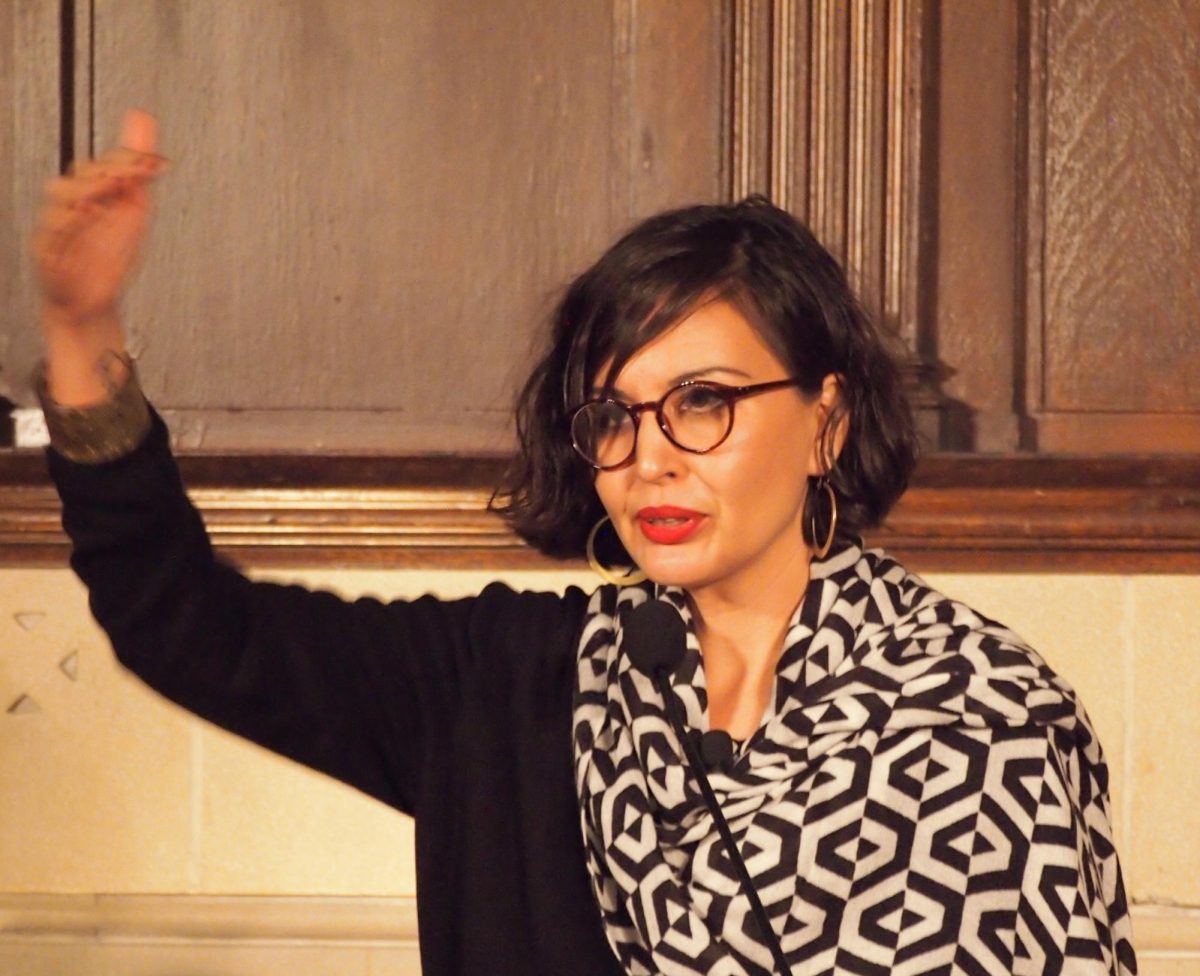To Oglala Lakota poet Layli Long Soldier, an “X” is more than a letter. On Feb. 26, clad in black platform boots and an all-denim ensemble, Long Soldier read an excerpt from her poem “135 Xs” to a packed Cathedral of Learning classroom.
“X marks the verbose legal language used to distract or dull the senses,” Long Soldier read. “X marks the swindling made possible only because of a language they could not read or write.”
Written for the 2022 documentary “Lakota Nation vs. United States,” the poem addresses the Xs used as signatures by 135 Native American tribal leaders in the 1868 Treaty of Fort Laramie. The treaty aimed to establish peace between Natives and white settlers by creating land boundaries. The poem Long Soldier read, “135 Xs,” exposes the injustices within this treaty, such as how Native leaders could not understand the terms, as they could not read or write, and how the treaty was broken by the U.S. government nine years later.
The poem, which Long Soldier said took two years and countless rounds of editing to complete, allowed attendees a glimpse into her writing process. She said she looks to her emotions for inspiration.
“Once I realized it was the Xs that had the most emotional heat for me, then that helped me find the form. And I decided to make a piece with Xs, and each stanza would begin with an X. Therefore, I made the goal that I would write 135 lines of Xs,” Long Soldier said.
Long Soldier was the latest poet to participate in the Pittsburgh Contemporary Writers Series, a program offering free poetry craft talks and readings to the public. Diana Khoi Nguyen, director of the series and an assistant professor at Pitt, first encountered Long Soldier’s work at a writing retreat in 2018. Nguyen said she was struck by its depth and relevance.
“I think we’re taught in school a very limited way of engaging with the world,” Nguyen said. “Then when it comes to creative expression, it’s just so broad. I think what I love about Layli’s work is she takes things that are really important to her, that aren’t only personal. They also impact the community and family. They work with history.”
Long Soldier, who lives in Tsaile, Arizona, in the Navajo Nation, is an advocate against the oppression of Indigenous populations. Her work often functions as a response to governmental actions against Native Americans, like her 2017 book, “Whereas.”
The title “Whereas” is inspired by the language of the 2009 Native American Apology Resolution. The U.S. government released the apology within a defense appropriations spending bill, and it was never publicly acknowledged by then-President Barack Obama. In “Whereas,” Long Soldier deconstructs the apology in an image-text format, outwardly exposing the U.S. government’s true intentions — for the government, the apology functions as a scapegoat.
In her 2017 book, “Whereas,” Long Soldier notes, “Whatever comes after the word ‘Whereas’ and before the semicolon in a Congressional document falls short of legal grounds, is never cause to sue the Government, the Government’s courts say.” (Whereas, 2017, p. 70).
While Long Soldier’s poetry may educate its readers on lesser-known history, that’s not the main purpose of her work, Nguyen said.
“I think her main goal is not to educate people, right? That’s a byproduct of her engaging and responding to this insulting, awful, enraging thing that happened,” Nguyen said. “And I think what I’m drawn most to in her book is like, wow, how do we articulate when we have these uncomfortable feelings?”
Long Soldier’s craft talk provided writing and revision insights to students like Tessa Kilby, second-year creative writing MFA student at Chatham. Kilby said Long Soldier’s use of image-texts creates deeper meaning in her work.
“I love the way that she plays with forms specifically. A lot of them seem so unconventional, in a positive way. I’m someone who likes weird forms, so I appreciate it. [The form] definitely makes it more impactful,” Kilby said.
Long Soldier’s work is nationally recognized — “Whereas” was the winner of the 2017 National Book Critics Circle Award for Poetry and finalist for the 2017 National Book Award for Poetry. Despite this acclaim, Long Soldier said she still experiences challenges when writing about topics that impact not just herself, but her community.
“When we are working on these pieces for our people, for our community, for history, I don’t know about you, but I feel a huge responsibility to get everything right. It has to be perfect,” Long Soldier said.
Beyond her poetry, Nguyen chose Long Soldier for the PCWS series because of her humble and approachable attitude.
“There’s such an accessibility and warmth and care for others in how she proceeds. I really wanted that to come across in the community,” Nguyen said.
Long Soldier doesn’t take herself too seriously, according to Nguyen. Throughout the craft talk, Long Soldier laughed at technical challenges and elicited giggles in the audience with honest answers about her writing process.
“I budget about 80% of my time when I’m writing to fail. I’m completely okay with writing really bad stuff,” Long Soldier said. “I want to try things. I want to see what would happen.”
Ultimately, Long Soldier carries a strong message — appreciate the role of Indigenous populations in our history and modern lives.
“We should understand that whoever you are, wherever you’re from, if you live on this land in this country, there is a treaty agreement that has made it possible for non-native people to reside and to live here,” Long Soldier said.


